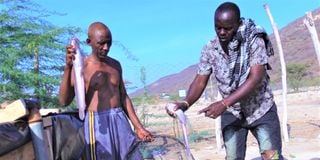Isiolo pastoralists turn to fish farming as alternative source of livelihood

Balwaqa Agro fisheries group secretary Khalif Dabaso (L) and Mohammed Roba display catfish harvested from their raised wooden liner pod at Awarsitu in Merti, Isiolo.
As drought continues to wreak havoc in over 30 counties exposing more than four million Kenyans to hunger, a group of pastoralists in remote Awarsitu village in Merti, Isiolo is in high spirits over their departure from over-reliance on livestock keeping.
Two years ago, while some residents in low lying areas in the semi-arid county grappled with floods occasioned by bursting of River Ewaso Nyiro banks, Balwaqa Agro fisheries group saw an opportunity to maximize their income.
While villagers killed catfish fingerlings deposited near their homes on suspicion of being snakes, the group chose to explore the unfamiliar territory of fish rearing as alternate source of livelihood following a training by Catholic Relief Services.
The training carried out in Isiolo town, Kinna and Sagana in Kirinyaga County also helped the 25 members in setting up a raised wooden liner pod at the village where they have been rearing fish in the last two years after abandoning pastoralism.
The ongoing drought, which is Kenya’s worst in four decades, has resulted in massive death of livestock, drying of water sources and depletion of pastures in the county threatening pastoralism which is the region’s main economic stay.
The situation has sparked resource based conflicts that have claimed dozens of lives in the recent past and rendered over 160, 000 residents’ (more than half of the total population) food insecure.
The group’s secretary Mr Khalif Dabaso says the training on nutritional benefits of fish lured them into taking the risk and that the venture offered them a relief from the hustle of walking longer distances in search of water and pastures for their livestock.

Balwaqa Agro fisheries group secretary Khalif Dabaso displays catfish harvested at their pod at Awarsitu village in Merti, Isiolo. The group diversified from pastoralism to fish rearing to cope with climate change.
“We used to, whenever floods occur, watch the fish deposited within the village die and for the children to play with but were amused after learning of its nutritional benefits and how to feed and protect them against predators such as lizards and birds,” he said.
The new craze has seen fish consumption surge locally with the dish now a popular item in the menu of hotels at Merti town that hosts a number of county and national government offices.
Fish contains among other nutrients Omega-3 fatty acids and vitamins D and B2 associated with improved brain health, growth of red blood cells and lower risk of heart diseases and blood pressure.
Ms Sadia Qura, the treasurer, says fish rearing had enabled them to address hunger and malnutrition especially among children aged below five years at household level.
“We never used to eat white meat but fish has become common at our homes thereby improving the health status of our children and encouraging other residents into consuming it. We were taught how to prepare it and cannot sleep on an empty stomach,” she reveals.

alwaqa Agro fisheries group secretary Khalif Dabaso harvests fish at their raised wooden liner pod at Awarsitu in Merti, Isiolo. The group diversified from pastoralism to fish rearing to cope with climate change.
Isiolo fisheries director Felix Muthomi says mudfish thrive well in dry conditions and that a pond must be covered with a shade net to reduce the evaporation rate.
“Apart from the normal feeds, farmers can feed them with homemade feed such as slaughter waste,” Mr Muthomi said, hailing pastoralists for diversifying their livelihoods to cushion them against effects of climate change.
The county government, he said, had in partnership with several organizations trained several groups on fish rearing in Merti Sub-County while also connecting established farmers to markets.
Besides the local market in Merti town that is several kilometres away, the farmers also sell fish in hotels and institutions within Isiolo town, some 200 kilometres away with a kilo being sold at Sh200.
During a recent interview, the farmers lamented over transport and preservation challenges saying they have on some occasions incurred huge losses after the fish died before delivery at the market.
They have been transporting the live animals while wrapped in a tent material with some volume of water using lorries from the area to Isiolo town, a journey that takes between four and five hours, which costs between Sh30, 000 and Sh50, 000 depending on tonnes.
“The water helps the fish remain wet as it can die if left out of water for a long time,” one of the members noted, saying the live animal fetches better prices than one that is dead or slaughtered.
High cost of supplementary feeds whose kilo goes for between Sh200 and Sh300 is also a major impediment in fish rearing, Mohammed Roba, a member, says while appealing for support to establish a mega pond to maximize their returns.
“If we can get subsidized feeds and be supported to expand the capacity of our pod, which currently has 2500 fishes, we can increase productivity,” Mr Roba appeals.
The group that earns Sh700, 000 on average annually intends to expand their market from Isiolo to neighbouring Samburu, Meru and Laikipia counties.
They have besides their individual share-out of the profit being offering loans to members from their savings at a 10 percent interest rate, payable after a month.
“We have been able to comfortably pay school fees for our children and also provide loans to members which enables them sort their urgent bills and even start income generating projects,” she notes.
The venture, they say, has not only uplifted their lives but also enabled them cope with the devastating effects of climate change which weather man has already warned will worsen in coming months.





